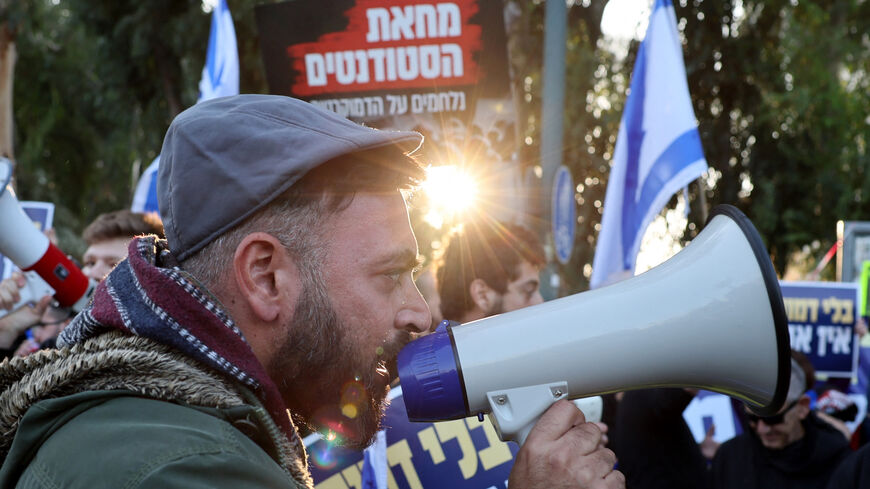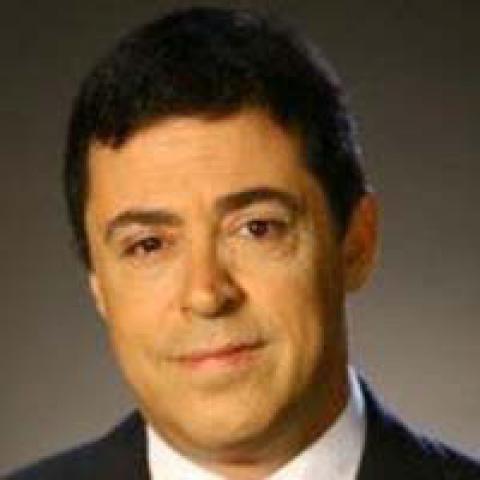Organizers of the protest against the judicial overhaul pushed by the Netanyahu government announced Friday they will hold another mass rally in Tel Aviv, Saturday night.
Former Police Commissioner Roni Alsheikh is set to speak at the event, the third such demonstration. Two weeks ago, some 80,000 people demonstrated against the judicial reforms. Last Saturday, the number rose to 130,000. Organizers are expecting even more for the upcoming rally.
Israelis are fighting back against those they accuse of plotting to dismantle their democracy, chief among them Prime Minister Benjamin Netanyahu. The surging protest movement is turning into a major problem for Netanyahu, who finds himself facing wide public anger, warnings by hundreds of leading economists and jurists, signs of foreign divestment and international condemnation.
The United States, Israel’s most important ally, is leading the diplomatic charge, urging Netanyahu to rethink his plans.
A former senior Israeli diplomat told Al-Monitor on condition of anonymity, “It’s a frequent flyer program," noting that US national security adviser Jake Sullivan flew into Israel last week and Secretary of State Antony Blinken is due next week. “Netanyahu wants to talk with the Americans about Iran. They want to talk with him about the possibility that Israel will turn into Iran.”
The economic issue is perhaps the only issue that could stop the legislative blitz by Netanyahu and his ultranationalist and ultrareligious coalition partners. Netanyahu prides himself on his stewardship of Israel’s burgeoning economy and the wave of privatization he has driven over more than a decade, with fiscal liberalization, acceleration of Israel’s high-tech startup industry, exploitation of natural gas discoveries as a strategic asset and other accomplishments.
On Jan. 26, the Israel-based global payroll management platform Papaya Global announced plans to withdraw its funds from Israel. Papaya’s Israeli co-founder and CEO Eynat Guez tweeted that the government’s planned moves threaten the country’s democracy and economy, saying, “There is no certainty that we can conduct international economic activity from Israel.”
The announcement set off a storm and Disruptive VC and Disruptive AI, two venture-capital funds controlling more than $200 million, reported their foreign investors had asked that their capital be held in banks outside Israel. The funds’ manager Tal Barnoach said, “The message is simple, we are concerned that Israel’s banking activity will also be damaged and next in line will be Israeli citizens.”
Netanyahu has surely been monitoring the impact of the controversial economic and legislative reforms led by his close ideological ally, Hungary’s authoritarian Prime Minister Viktor Orban, who last year imposed a 10% windfall tax on banks and other companies as part of emergency measures to control his country’s crippling budget deficit, runaway inflation and unemployment.
Netanyahu must be well aware of the repercussions of any whiff of uncertainty or risk to investments. He knows that his popularity notwithstanding, Israelis will not forgive him for sending the economy into a downturn that would erode their standard of living, result in layoffs and undermine its reputation as a start-up nation that has made it a major global economic and tech player.
Netanyahu could find himself forced to choose between continuing his brutal assault on the Supreme Court’s powers and the other reforms being led by Justice Minister Yariv Levin or easing up to reconsider his government’s moves.
Responding to the latest developments, Netanyahu said at a news conference this week, “I have heard concerns about the effect of the legal reforms on our economic resilience. The truth is the opposite. Our steps to strengthen democracy will not harm the economy.” Then the next day, Jan. 26 — the final day of trading before the Sabbath — signs emerged on the Tel Aviv stock exchange of weakening government bonds, a bellwether of economic stability. At this rate, Netanyahu may already be too late.
The protests unfolding in Israel over the past three weeks are also taking place against a backdrop of growing tensions with the Palestinians. This week, CIA Director Bill Burns arrived in Israel for meetings with his counterpart, Mossad Chief David Barnea and other senior officials, as well as with senior Palestinian officials in Ramallah. On Thursday, the army and Shin Bet security agency forces launched a rare daytime raid on the West Bank town of Jenin, killing 8-10 men described as Islamic Jihad terrorists. Palestinian President Mahmoud Abbas subsequently announced the cessation of security coordination between Israel and his security forces, and Islamic Jihad operatives fired six rockets from the Gaza Strip into Israeli territory on the night between Thursday and Friday. Israel retaliated early Friday with airstrikes on Gaza.
Such escalation seems like the last thing Netanyahu needs at this sensitive juncture, but is it? The turmoil could offer Netanyahu a legitimate diversion from the intensifying public protests.
Be that as it may, all signs point out the mass rallies will only grow. New groups have been organizing and joining the protest, blocking roads, writing letters and issuing statements. Artists, musicians, LGBT activists, former high-ranking officers, lawyers, economists and labor union leaders are all joining in. For the first time in a long while, the protest against Netanyahu is not limited to leftist activists and Tel Aviv liberals and has drawn in moderates on the right and religious protesters as well as residents of outlying towns in the Negev and Galilee.
Netanyahu fears public protests. The last time he faced such massive outrage was the summer of 2011 with its widespread mass demonstrations against the cost of living. Under pressure, Netanyahu entered into a deal with Hamas for the release of soldier Gilad Shalit, kidnapped and held for five years in Gaza. In return, Netanyahu freed 1,100 Palestinians jailed in Israel for terrorism offenses, abandoning his longstanding ideological opposition to negotiating with terrorists.








